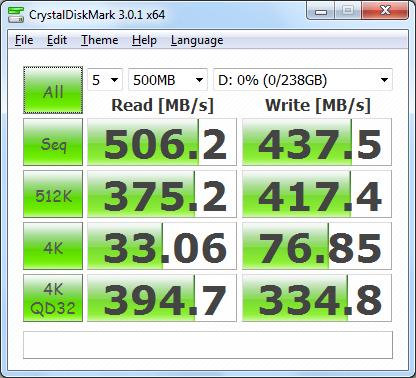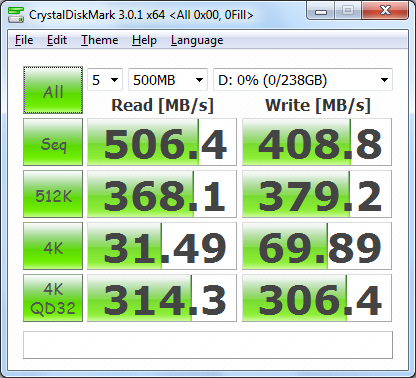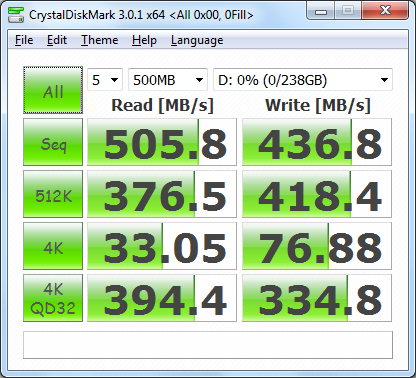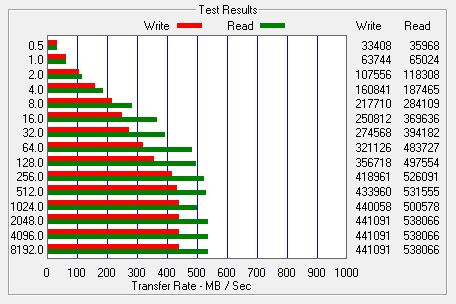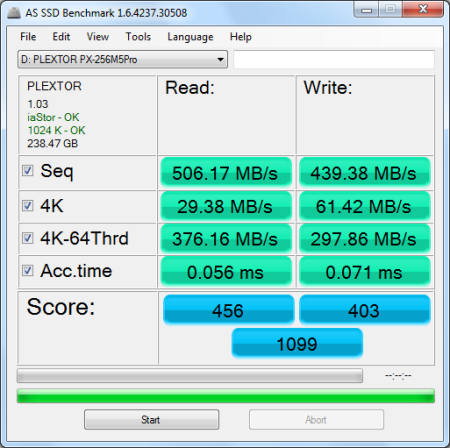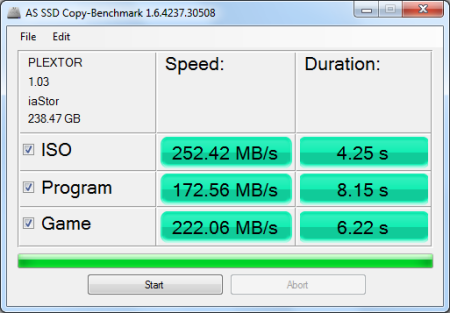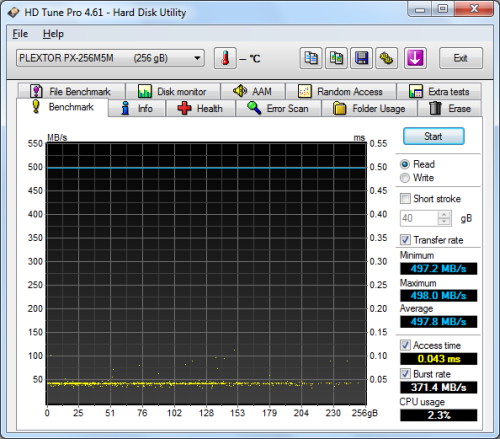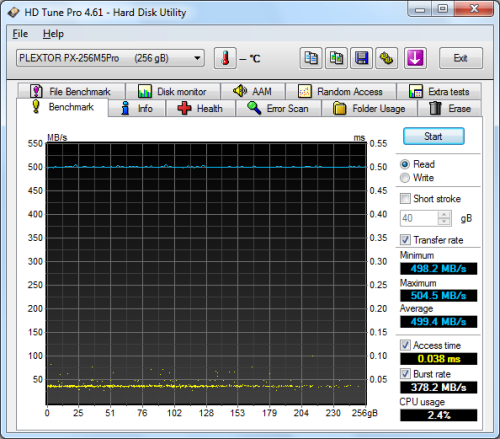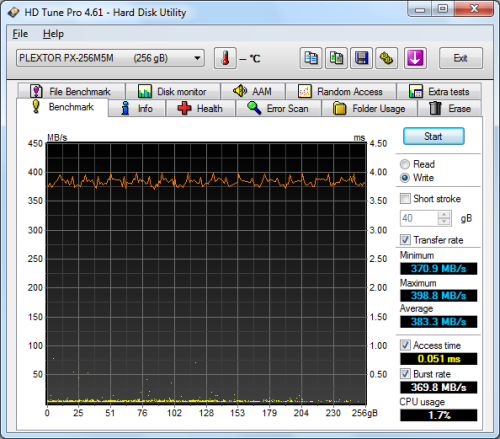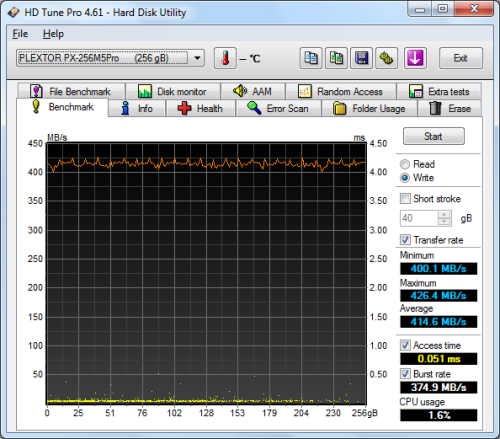

Model: Plextor PX-256M5M 256GB mSATA Solid State Drive
Manufacturer: Plextor
Provided By: Plextor LLC
As one of the biggest names in the storage industry, Plextor doesn't need much of an introduction. For more than a decade, they've produced some of the best optical drives the industry has seen. Known the world over for their quality, performance, and features, these drives have become favorites among consumers and professionals alike. Today, Plextor continues to lead the way by bringing cutting edge storage technologies to market. Along with a vast assortment of high-performance DVD and Blu-ray drives, the company offers NAS devices, external hard drives and a growing number of solid state drives.
Building on the success of their consumer solid-state drives (SSD), Plextor now has its sights set on the mobile storage market. At this year's Consumer Electronics Show (CES), the company unveiled its first mSATA SSD, the M5M. Designed for ultrabooks, tablets and other portable devices with limited space, the M5M provides high-performance and reliability in a space one-eighth the size of a standard 2.5 inch drive. This pint-sized SSD combines Marvell's 88SS9187 "Monet" controller with Toshiba's 19nm Toggle Mode MLC NAND to deliver up to 540MB/s read and 430MB/s write transfer rates. The M5M also supports Plextor's exclusive True Speed and True Protect technologies as well as the SATA Device Sleep (DEVSLP) standard which extends the battery life of a device by reducing the drive's power consumption to 1 mW when it is not in use.
For this review, Plextor sent us the PX-256M5M. This 256GB SSD comes equipped with 512MB of on-board cache and is capable of delivering up to 540MB/s sequential read and 430MB/s sequential write speeds as well as up to 79,000 random read and 77,000 random write IOPS.
| Plextor PX-256M5M 256GB mSATA Solid State Drive | |||||||||||||||||||||||||||||||||||
General Specifications
Performance
Power Consumption
Environment and Reliability
Dimensions and Weight
Other Features
|
Needless to say, this is only a taste of what the PX-256M5M has to offer. To give you an idea of what to expect, we'll take a closer look at Plextor's new 256GB mSATA SSD and then see how well it performs. Does the PX-256M5M have what it takes? Can it deliver the performance and features that we've come to expect from Plextor? Keep reading as we find out.
Compared to the flashy, blue boxes that Plextor's 2.5-inch SSDs come in, the M5M's packaging is pretty boring. The drive ships in a simple clamshell similar to what memory modules come packed in. The sticker on top shows the model, capacity, firmware version and serial number of the drive inside. It's hard to make out in these pictures, but Plextor has also managed to squeeze in the drive's specs.
Physical Features:
The M5M follows the JEDEC MO-300 standard for mSATA SSDs. It measures a mere 50.8 x 29.8 x 3.6 mm and is about one-eighth the size of a standard 2.5-inch drive. The M5M also has a 52-pin mSATA connector which supports data transfer rates up to 6 Gb/s.
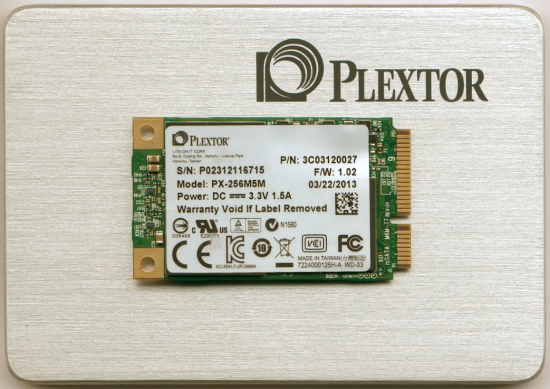
Like the M5 Pro and M5Pro Xtreme, the M5M uses Marvell's new 88SS9187 "Monet" controller. The 88SS9187 is powered by a dual-core Marvell 88FR102 V5 CPU and supports up to eight NAND flash channels. The controller also features a high-performance ECC engine with adaptive read and write scheme as well as on-chip RAID functionality.


For the PX-256M5M, Plextor has opted to use Toshiba's 64GB 19nm TH58TEG9DDJBA89 Toggle Mode NAND flash chips. Looking at the pictures above, you can see that there are two of these chips on either side of the PCB. The drive also has a single Micron 512MB DDR3 memory chip that is used for caching and garbage collection.
The test system used in this review was an HP 8200 Elite. The computer came equipped with an Intel Core i5-2400 CPU, 4GB of DDR3 1333MHz memory, Seagate Barracuda 7200.12 ST3250312AS 250GB SATA 6 Gb/s hard drive, NVIDIA Quadro FX580 512MB PCIe graphics card and an Intel 82579-LM gigabit network card. For the operating system, I installed a fresh copy of Windows 7 Enterprise. I should also point out that our test system is not equipped with an mSATA port so we had to use an mSATA to SATA 6 Gb/s adapter card.

To test the performance of the Plextor PX-256M5Pro Xtreme, I ran a series of benchmarks using CrystalDiskMark 3.0.1, HD Tach RW 3.0.4.0, ATTO Disk Benchmark 2.46, AS SSD, HD Tune Pro 4.61, Anvil's Storage Utilities and Iometer. For comparison, I've also included test results from the OCZ Vector, Plextor PX-256M5Pro Xtreme, Samsung SSD 840 Pro, Samsung SSD 840, Kingston Ultra Plus, OCZ Vertex 4, OCZ Agility 4, Kingston SSDNow V300, Kingston HyperX 3K and SanDisk Extreme.

Like the original M5 Pro and M5Pro Xtreme, the M5M is based on Marvel's 88SS9187 controller chip. Looking at the screenshot above, you can see that it performs equally well with both incompressible (0%) and compressible (100%) data.
CrystalDiskMark 3.0.1:
First, I ran a few quick tests using CrystalDiskMark. This benchmark tool measures the performance of a storage device by testing its sequential read and write speeds as well as its random read and write speeds using blocks 512K and 4K in size.
According to Plextor, the PX-256M5M is capable of reading at 540 MB/s and writing at 430 MB/s when connected to a SATA 6 Gb/s port. While the drive performed well, it came up a bit short of these numbers in CrystalDiskMark's sequential read and write speed tests.
The PX-256M5M performed equally well when using highly compressible 0x00 (0 Fill) data. This time around, the drive was able to read at 506.4 MB/s and write at 408.8 MB/s.
HD Tach RW 3.0.4.0:
Next, I used HD Tach to test the PX-256M5M's read, write and burst speeds as well as its seek times and CPU usage.
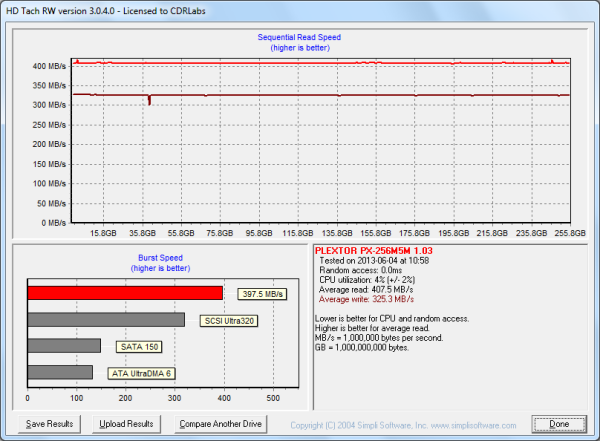
Looking at the screenshot above, you can see that the PX-256M5M had average read and write speeds of 407.5 MB/s and 325.3 MB/s respectively, as well as a burst speed of 397.5 MB/s.
ATTO Disk Benchmark 2.46:
I also used ATTO Disk Benchmark to test the PX-256M5M's sequential read and write speeds. The tests are run using blocks ranging in size from 0.5KB to 8192KB and the total length set to 256MB.
When tested with ATTO, the PX-256M5M's read speeds topped out at about 538 MB/s and its write speeds at 441 MB/s.
AS SSD:
AS SSD is a relatively new benchmark designed specifically for solid state drives. The application contains five synthetic tests used to determine the sequential and random read and write performance of a drive.
AS SSD also includes a copy benchmark. This test copies an ISO (two large files), program (many small files) and game (small and large files), returning the speed and duration of each.
HD Tune Pro 4.61:
Next, I ran a series of tests using HD Tune Pro. This hard disk utility measures a drive's performance by testing its sequential read and write speeds as well as its access time, burst rate and CPU usage. For this review, I'm also going to use it to benchmark the PX-256M5M's random read and write speeds, random access times and the number of operations per second.
The PX-256M5M performed very well when benchmarked with HD Tune. The drive had average read and write speeds of 497.8 MB/s and 383.3 MB/s, respectively, and a burst rate of 371.4 MB/s when reading
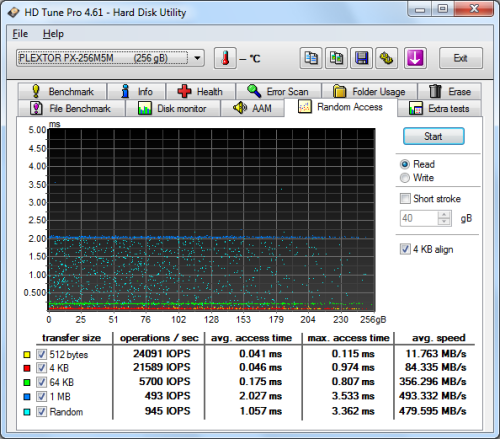 Plextor PX-256M5M - HD Tune Random Access Read |
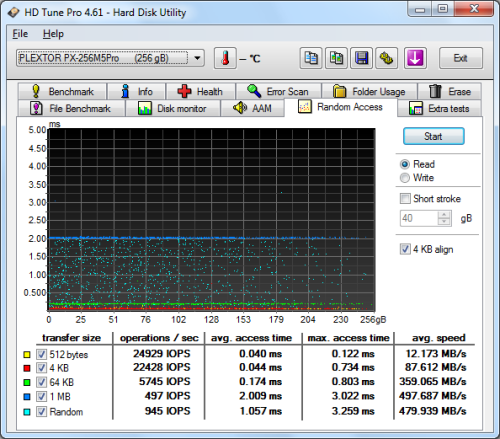 Plextor PX-256M5Pro Xtreme - HD Tune Random Access Read |
 Plextor PX-256M5M - HD Tune Random Access Write |
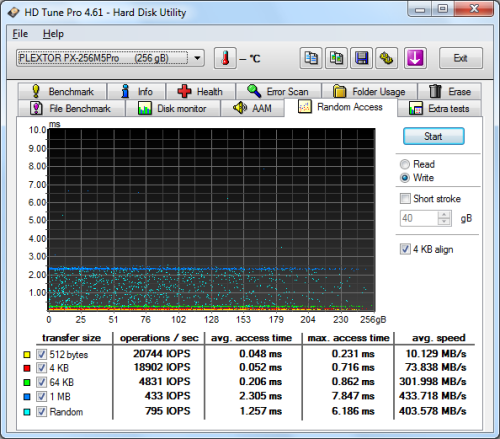 Plextor PX-256M5Pro Xtreme - HD Tune Random Access Write |
The PX-256M5M didn't disappoint when doing random reads and writes. When writing 4KB blocks, the drive reached 19,374 IOPS and had an average speed of 75.681 MB/s. The PX-256M5M was even faster when reading, reaching 21,589 IOPS with an average speed of 84.335 MB/s.
Anvil's Storage Utilities:
Anvil's Storage Utilities is another new benchmark designed with SSDs in mind. The standard storage benchmark measures a drive's performance by testing its transfer speeds, access times and IOPS.

Iometer:
Lastly, I ran a series of tests using Iometer. This tool can be configured to benchmark a number of things. In this case, I used it to measure the PX-256M5M's read and write speeds and the number of operations per second. The tests were run using random bytes and a queue depth of 3.
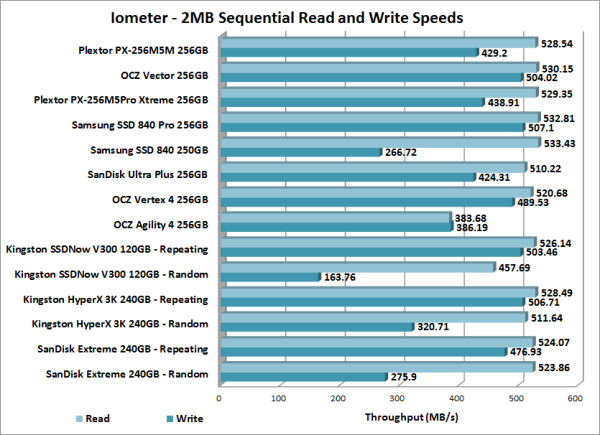
The PX-256M5M's performance was very similar to what we saw in our other tests. The drive was able to read at 528.54 MB/s and write at 429.2 MB/s.
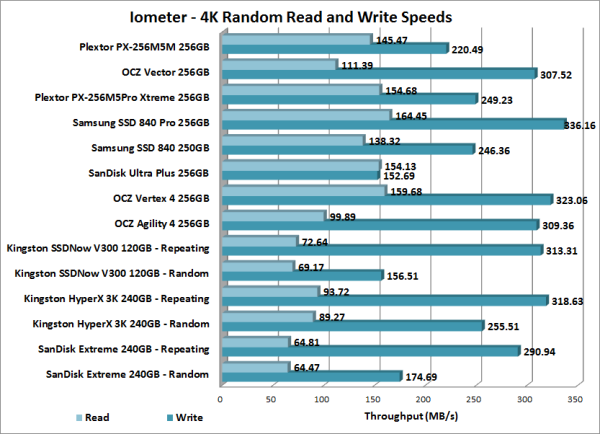
The PX-256M5M also performed relatively well when doing random reads and writes. In our tests, the drive was able to read at 145.47 MB/s and write at 220.49 MB/s.
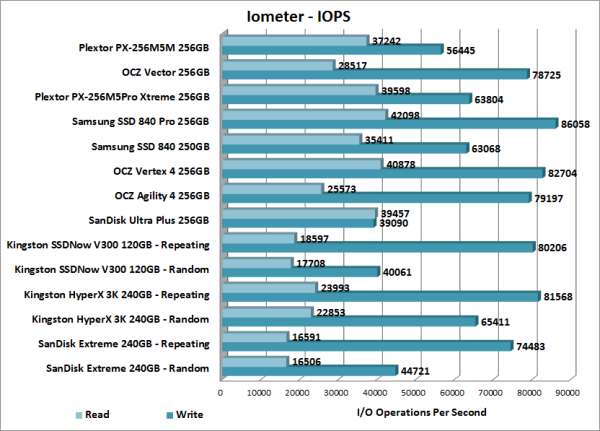
According to Plextor, the PX-256M5M is capable of 79,000 IOPS when reading and 77,000 IOPS when writing 4K blocks. In our tests, the drive reached 37.242 random read IOPS and 56,445 random write IOPS. The only way I came close to Plextor's numbers was to increase the queue depth. With the queue depth set to 32, the PX-256M5M reached 76,898 random read IOPS and 72,639 random write IOPS.
TRIM and True Speed:
While SSD's offer many benefits, there are some downsides to using flash memory. One of the biggest issues people run into is performance degradation. Over time, an SSD will run out of fresh blocks and will have to write over data the file system has marked as deleted. This procedure is very complicated and can slow an SSD's write speeds considerably.
To fix this problem, most manufacturers have added TRIM support to their SSDs. The TRIM command allows an operating system, such as Windows 7, to tell an SSD which data blocks are no longer in use. Using this information, the drive pro-actively erases these blocks and adds them to the free block pool.
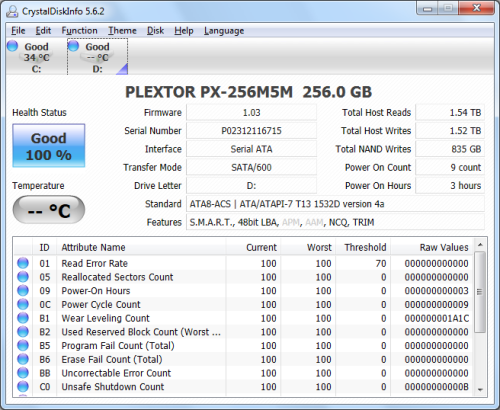
The M5M is the latest drive to ship with their Plextor's exclusive True Speed technology. By leveraging the power of advanced firmware, True Speed ensures that the SSD works at its full potential even after extensive use and long periods of operation. Along with support for TRIM, the M5M's firmware incorporates Plextor's Bad Block Management, Global Wear Leveling and Instant Restore technologies. Where Bad Block Management and Global Wear Leveling optimize the way data is written on the drive, Instant Restore maintains "like new" performance by reorganizing data to maximize the number of free cells.
Plextor's True Speed technology works very well, as I saw very little performance degradation, even after hours of testing. I was finally able to overwhelm it by using Iometer to fill the entire drive and then running a random write test for 30 minutes. This had little impact on the PX-256M5M's read speed. However, its average writing speed dropped to 34.5 MB/s when in this "dirty" state.
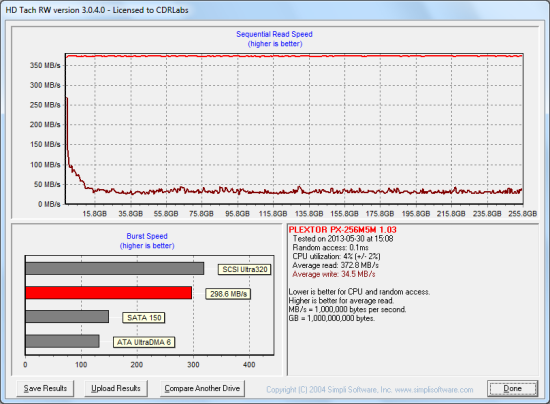
Plextor PX-256M5M - Dirty
I let the computer sit for a few hours and then reran the test. Looking at the screenshot below, you can see that the PX-256M5M's average write speed had increased to a mere 40.8 MB/s. Needless to say, this was not the result I expected, especially when you consider how well Plextor's other SSDs have done in this test.
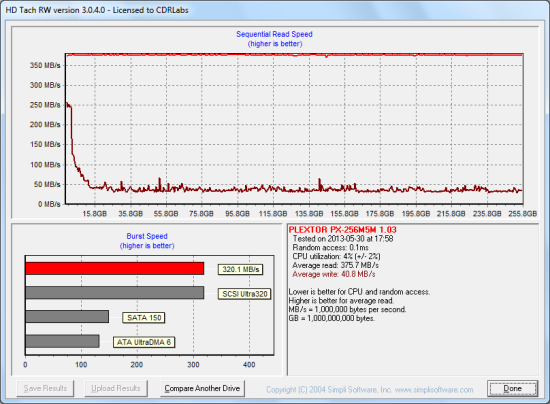
Plextor PX-256M5M - After TRIM
The only thing I can figure is that, like the M5Pro Xtreme, the M5M is using a new garbage collection algorithm which can only partially restore the drive's performance. To fully restore the M5M you need to trigger TRIM and, for whatever reason, this was not happening in our tests.
With this in mind, I went back and reran the test using AS SSD instead of HD Tach. AS SSD isn't as low level as HD Tach nor does it produce a nice looking graph. However, it does let us test a drive's read and write speeds without having to delete the volume. Once again, I used Iometer to fill the PX-256M5M and put it into a "dirty" state. This had very little effect on the drive's read speed. However, its sequential write speed dropped to 8.70 MB/s

Plextor PX-256M5M - Dirty
I let the computer sit for about 30 minutes and then reran the test. Looking at the screenshot below, you can see that the PX-256M5M's average write speed had increased to 415.23 MB/s.
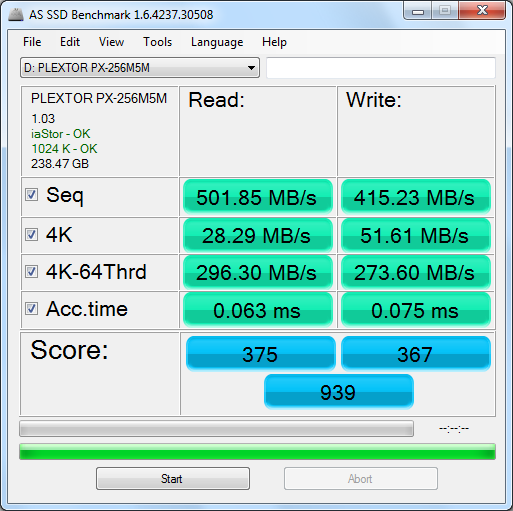
Plextor PX-256M5M - After TRIM
Lastly, I used Plextor's Plextool software to perform a secure erase of the PX-256M5M. With the drive wiped clean, it had average read and write speeds of 512.17 MB/s and 420.18 MB/s, respectively.
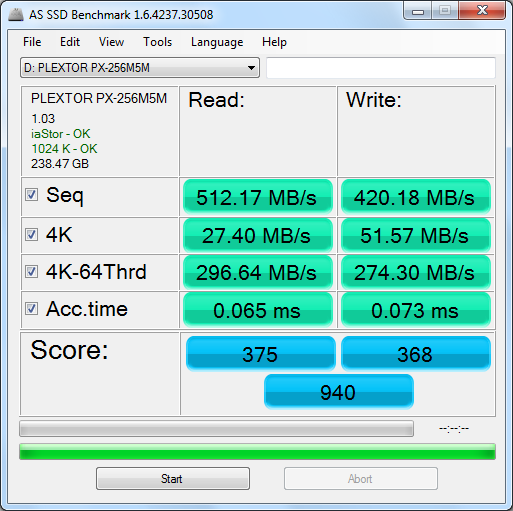
Plextor PX-256M5M - Secure Erase
Final Thoughts:
Plextor's new M5M series SSD is proof that good things do come in small packages. This pint-sized powerhouse combines Marvell's new 88SS9187 controller with Toshiba's 19nm Toggle Mode NAND flash to deliver a fast, responsive computing experience. In our sequential read and write tests, the PX-256M5M was able to read at speeds as high as 538 MB/s and write at speeds in excess of 408 MB/s. It also did reasonably well our random write tests, producing more than 56,000 IOPS at low queue depths. Given, these numbers aren't as high as what we saw with the M5Pro Xtreme. However, they're still pretty impressive, especially for an mSATA SSD.
Impressive performance isn't the only thing the M5M has to offer. The drive supports Plextor's exclusive True Speed technology, which does an excellent job of maintaining original performance levels, even after intensive use and long periods of operation. The M5M also features Plextor's True Protect double-data protection technology, which provides integrity checking for long-term data accuracy and 256-bit AES full disk encryption for data confidentiality. Last but not least, the M5M supports the new SATA Device Sleep (DEVSLP) standard which extends the battery life of a device by reducing the drive's power consumption when its not in use.
The M5M is available now in 64GB, 128GB and 256GB capacities. Prices on Amazon.com currently range from $75 up to $200 for the 256GB version reviewed here.

Highs:
- mSATA form factor
- Available in 64GB, 128GB and 256GB capacities
- Excellent sequential read and write speeds
- Good random read and write performance
- Performs equally well with compressible and incompressible data
- SATA 6Gb/s interface
- Toggle Mode NAND flash
- Large DRAM cache
- Exclusive firmware with Instant Restore, Global Wear Leveling and Bad Block Management
- True Speed technology provides consistent performance, even after intensive usage
- True Protect double-data protection technology
- 256-bit AES encryption
- DEVSLP power mode
- Supports TRIM, SMART and NCQ
- Reasonably priced
- 3 year warranty
Lows:
- None



